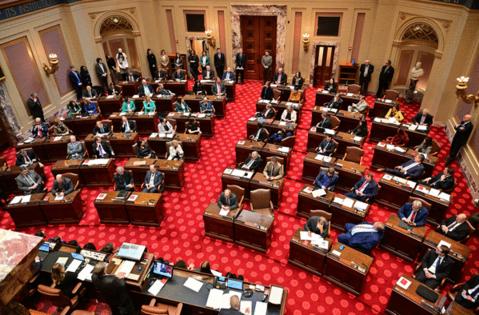Minnesota bill would ban using AI to create sexually explicit deepfakes of real people
Published in News & Features
ST. PAUL, Minn. — A bipartisan group of Minnesota state senators is pushing for more restrictions on convincing computer-generated sexually explicit images of real people.
Under a new bill, companies that provide artificial intelligence-generated “deepfakes,” or photorealistic videos or images of people, would have to shut off their ability to generate pornographic content of real people if operating in the state of Minnesota.
It comes after the Minnesota Senate moved two years ago to ban the dissemination of sexually explicit non consensual deepfakes, which have proliferated at a vast rate in recent years as AI technology becomes more advanced and commonplace.
As federal lawmakers move slowly on the rapidly evolving issue, more should be done on the state level to prevent harm from computer-assisted “nudification” of images, said bill sponsor Sen. Erin Maye Quade, DFL-Apple Valley.
“The harm is not in the dissemination, it’s in the creation,” she told reporters at a Monday news conference highlighting her bill, which has the backing of Republicans including Sen. Eric Lucero, R-St. Michael, who joined Maye Quade on her last deepfake bill. “It’s not the dissemination, it’s the fact that it exists at all.”
Growing issue
Recently developed AI image generators can take a clothed photo or video of a real person and create nude images, or place a real person’s face in existing pornographic content.
More often than not, it’s not consensual, victim advocates say.
The volume of sexually explicit deepfakes is staggering, by many estimates. In an often-cited 2019 study by the Dutch cybersecurity firm Deeptrace Labs, 96% of deepfakes online were pornographic.
One Minnesota resident, Megan Hurley, testified on her experience last week at the Senate Judiciary and Public Safety Committee and shared it again at Monday’s news conference.
Last June, Hurley learned a man she had known for 20 years and considered a friend had used a picture from her Facebook page to create realistic nude images and pornographic videos. She wasn’t the only one — there were deepfakes of 80 others, too, some she later tracked down with a friend to notify.
“This has caused irreversible harm to me and these other women,” she said. “I have been humiliated, I have never taken nude pictures or exchanged nudes with anybody, but because of this easily accessible website there are convincing, graphic images and pornographic videos of me on the internet forever.”
While most mainstream generative AI chatbots like Chat GPT or Meta AI do not allow the creation of sexually explicit images, many others do, Maye Quade said.
If the new deepfake bill became law, it will allow for civil penalties of up to $500,000 against companies who don’t restrict explicit image generation of real people. The state attorney general will be empowered to take legal action against companies that do not comply, and targets of deepfakes can bring lawsuits as well.
The Senate Judiciary and Public Safety Committee didn’t vote on the bill last week. There’s no House version, but Maye Quade said she has passed the bill along to Rep. Zack Stephenson, DFL-Coon Rapids, for consideration.
Speech implications
Like the 2023 Minnesota law banning the dissemination of deepfake images, the deepfake generation ban bill does not contain any exceptions for satirical, political or artistic speech.
A House version of the dissemination band provided an exception for sexual imagery deepfakes that are parody, satire, commentary, criticism or have political or news value. But the Senate voted unanimously to remove it.
If the new bill became law it would face serious challenges in court, where a judge may find it unconstitutional because it violates speech protections, said Alan Rozenshtein, an associate professor of law at the University of Minnesota.
“I recognize the problem of deepfakes, I think it’s a very serious problem. But people also have the right to create erotic imagery for their own consumption,” he said.
To address the problem of deepfakes lawmakers without violating Constitutional rights, lawmakers should focus on the harm caused by distribution, Rozenshtein said.
_____
©2025 MediaNews Group, Inc. Visit at twincities.com. Distributed by Tribune Content Agency, LLC.







Comments